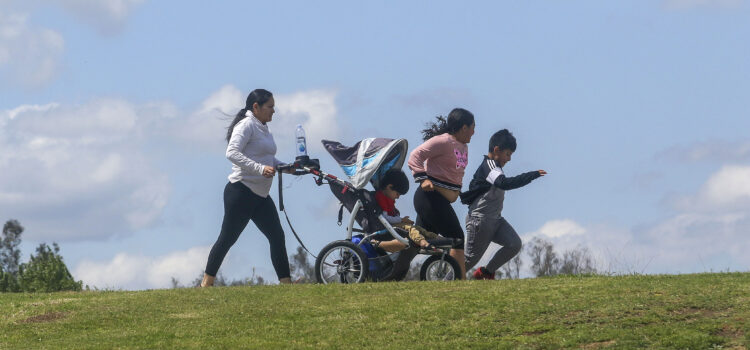
The COVID-19 pandemic has proven to be stressful for many people.
The uncertaintly of what could happen can cause fear and anxiety. And public health actions, such as social distancing, can make people feel isolated and lonely and can increase stress and anxiety, the CDC says. Research has proven that worry and stress contributes to poor health decisions.
As a result of the pandemic, many are guilty of overeating, binge-watching Netflix, and skipping their exercise. Although these are normal side-effects of dealing with a pandemic, health experts says it’s important to recognize these habits and aim to be healthier when it comes to eating, exercise and stress levels.
Kern Public Health nutritionist Aaron Stonelake said he has noticed habits of “mindless eating” or consumption without the realization of its excessive nature.
As with any type of food, portions are key. Stonelake recommends pouring out a serving of the package instead of eating straight from the package.
“Instead of eating out of a package, pour it into a bowl or count only a serving size,” said Stonelake. “For example, only grab two cookies. They need to be put away afterward to prevent the bad habit of going back for seconds.”
The University of Maryland Medical System suggests making a meal schedule, and listening to your cravings. “If you want sweet, eat fruit. Craving salt? Measure one ounce of nuts or an ounce of hummus. For crunchy, try carrot sticks, celery or other raw veggies. For a carb craving, try whole wheat crackers.”
Since kids are out of school, parents are providing additional meals each day than the typical school year, and with work, many may struggle to prepare fresh food.
Stonelake explained how proper preparation will help in the long-run. This means planning meals in advance and making a grocery list before going
shopping. Healthy ingredients need to be plentiful, “chopped fruits, veggies, nuts/seeds need to be readily available so children are not tempted by the less healthy foods,” he said.
Sweet snacks need to be offered sparingly as incentive treats, said Stonelake. He recommends finding creative recipes online that have the staple foods of a healthy diet. Ordering takeout does not need to be strictly limited, but it one should be mindful.
Dr. Colin Zhu, a family physician, explains the positive effects of a low fat, plant-based diet: improved immune system, more effective white blood cells, and weight maintenance. Making occasional swaps in everyday meals or embracing a more plant-based diet has tremendous benefits.
Additionally, children should be encouraged to be involved in every step of the meal process, from writing the list, to helping with shopping and preparing the food. The earlier they are taught, the more likely they will be to carry these healthy traits in the future.
As a fitness instructor for Kern Public Health, Jessica Laurente has noticed the effects of losing structure during the pandemic without additional facilities or establishments to go exercise.
“Without facilities, it becomes a habit to sit at home,” said Laurente.
It makes it easy to get out of a fitness routine and there is a loss of motivation, she said. Laurente recommends having an accountability partner is a great solution. She explained how when her best friend is out of town, they will send each other little challenges and workouts.
She also suggested to take advantage of the current free online advice services that are being offered during the pandemic.
Michigan State Department of Psychiatry even found that “consistency and sustained motivation may be enhanced by peer support, family support, or electronic platforms offering exercise programs.” Asking for help and getting others involved will create the positive atmosphere needed to maintain physical fitness during the quarantine effects of Covid-19.
Many parents may feel weary about allowing their kids to play with neighbors, and this can result in heavy electronic usage. Laurente understands that it becomes more difficult as the weather becomes hotter, but parks are open again. Laurente said parks are safe as long as social-distancing is maintained and guidelines are adhered to.
Many families may live in apartments without backyards, or do not have parks close by or they are unsafe. There are many activities that can be done indoors. Laurenete shared how her friends choose a physical activity and roll dice to see how many times it must be performed with their kids.
Coming up with simple and creative games such as this will keep everyone involved. “Stimulating movement is always key.”
“Families should go for daily walks either in the morning or in the evening, all together,” said Laurente. “Personally, my roommate, her daughter, and I will do yard work when it’s cool outside. You can combine outdoor activity with manual labor. Even playing a show with a choreographed dance can be fun.”
Finding what works best for a family will have long-lasting health effects and fun memories will be made in the process.
These strategies will help keep families healthy. Everyone is struggling during these uncertain times, but never forget the importance of nutritional and physical fitness. For any additional COVID-19 information, feel free to call (661) 321-3000 or visit https://kernpublichealth.com/.
Featured photo: A group practice social distancing and get some fresh air on the bike path near Beach Park. Photo by Henry A. Barrios for Kern Sol News